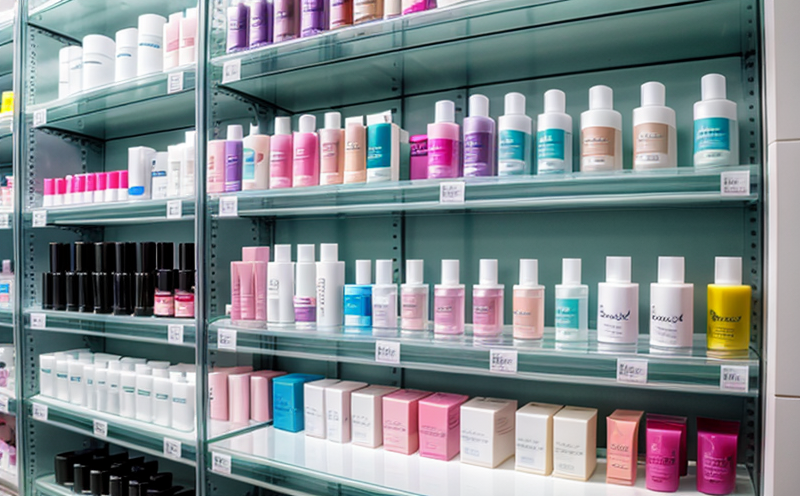Stability & Shelf Life of Cosmetic Formulations
The stability and shelf life of cosmetic formulations are critical aspects that influence product quality, safety, and consumer satisfaction. Stability testing ensures that the cosmetic products meet regulatory requirements throughout their shelf life, maintaining efficacy, safety, and sensory properties as intended.
Stability studies involve a series of tests designed to evaluate how well a formulation holds up under various environmental conditions such as temperature, humidity, light exposure, and storage duration. These tests are essential for quality managers, compliance officers, R&D engineers, and procurement teams who need to ensure that cosmetic products meet international standards and consumer expectations.
Understanding the stability of a cosmetic product is not just about ensuring its longevity; it also involves assessing potential degradation pathways and their impact on the product. This includes chemical changes in ingredients due to oxidation, hydrolysis, or other reactions, as well as physical changes like phase separation, sedimentation, or alteration in viscosity.
Regulatory bodies worldwide have stringent requirements for cosmetic products, including the European Union's Cosmetics Regulation (EC 1272/2006). The regulation mandates that manufacturers demonstrate the stability of their products over time. This requires a comprehensive approach to testing, encompassing both accelerated and real-time conditions.
Accelerated stability studies are conducted under more severe conditions than those expected in the market to predict potential issues within an acceptable shelf life period. For instance, samples may be stored at temperatures up to 45°C or higher for extended periods to simulate long-term exposure to heat and light. Real-time stability studies provide a closer approximation of actual storage conditions, allowing manufacturers to observe changes over time under more realistic circumstances.
During these tests, various parameters are monitored continuously to assess the product's performance. These include color, odor, texture, pH levels, microbial content, and physical appearance. Microbiological testing is particularly crucial for ensuring that the product remains safe for use by consumers.
The choice of test conditions depends on the specific formulation and its intended market. For example, a sunscreen might require additional testing to ensure it retains its SPF ratings over time, while a hair dye needs stability studies focused on color retention and fade resistance.
Accurate and reliable data from these tests are essential for formulating a successful marketing strategy and ensuring compliance with international standards like ISO 20798 (Cosmetics – Determination of pH value) or ASTM F1530 (Standard Practice for Accelerated Stability Testing of Cosmetics).
By conducting thorough stability testing, manufacturers can ensure that their cosmetic products maintain their quality and safety throughout the shelf life. This not only enhances consumer trust but also helps in maintaining a competitive edge in the market.
Benefits
- Informed Decision-Making: Stability testing provides critical data that informs decisions regarding product formulation, ingredient selection, and packaging design. This ensures that products meet both regulatory requirements and consumer expectations.
- Regulatory Compliance: Ensuring compliance with international standards such as the European Union's Cosmetics Regulation (EC 1272/2006) or other regional regulations is essential for legal compliance. Stability testing helps in meeting these stringent requirements.
- Predictive Testing: Accelerated stability studies allow manufacturers to predict potential issues that could arise over the product's shelf life, enabling timely corrective actions.
- Enhanced Consumer Trust: Consumers trust products that have undergone rigorous testing. Stable and safe cosmetic formulations enhance consumer confidence in the brand.
- Cost Efficiency: By identifying potential issues early through stability testing, manufacturers can avoid costly recalls or product discontinuations later on.
Eurolab Advantages
Eurolab is a leading provider of cosmetic testing services with expertise in stability and shelf life assessments. Our state-of-the-art facilities and experienced team ensure that we deliver accurate, reliable, and timely results.
We offer comprehensive stability testing tailored to the specific needs of each client. Our services include accelerated and real-time tests under various environmental conditions, ensuring a thorough evaluation of your cosmetic formulations. We use advanced instruments and follow international standards such as ISO 20798 for pH determination.
Our team of experts provides detailed reports with actionable insights that help you make informed decisions about product development and quality assurance. Additionally, we offer support in navigating regulatory requirements and ensuring compliance with international standards.
Eurolab's commitment to excellence is reflected in our long-standing reputation for providing high-quality services. Our clients include major cosmetic brands as well as smaller companies seeking to ensure the safety and efficacy of their products.
International Acceptance and Recognition
- American Society for Testing and Materials (ASTM): ASTM F1530 is widely accepted in the United States for accelerated stability testing of cosmetics. This standard ensures that tests are conducted under controlled conditions to predict potential issues.
- European Norms (EN): EN 2869:2014 provides guidelines for determining the pH value of cosmetic products, ensuring consistency and accuracy in testing.
- International Organization for Standardization (ISO): ISO 20798 is recognized globally for its stringent requirements on the determination of pH values. This standard ensures that manufacturers adhere to international best practices.
- World Health Organization (WHO): WHO guidelines on cosmetic hygiene are widely respected and followed by regulatory bodies worldwide, ensuring a consistent approach to product safety.





